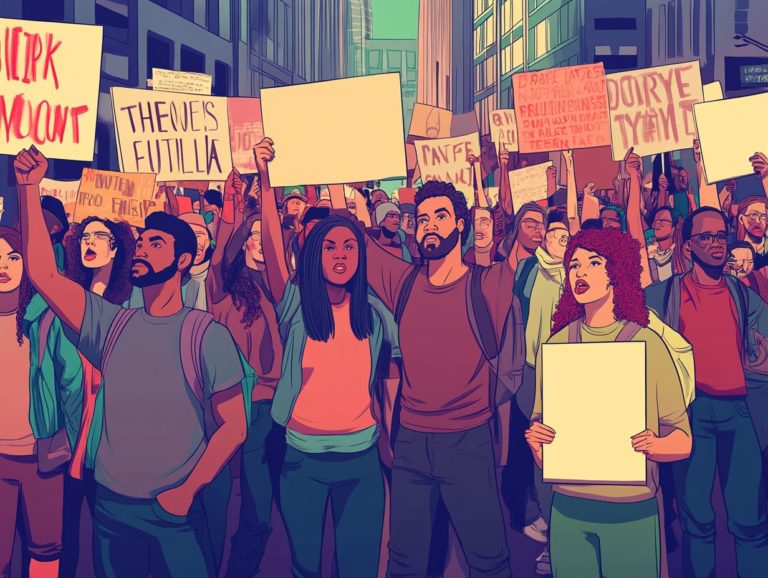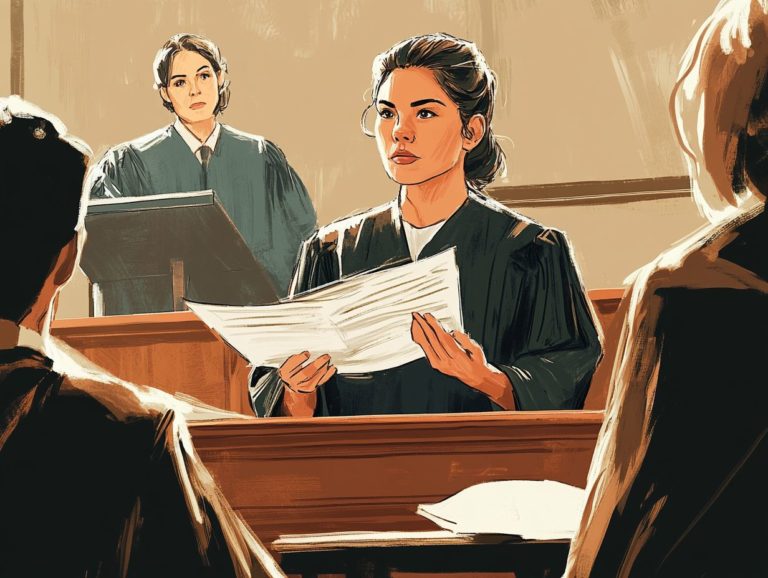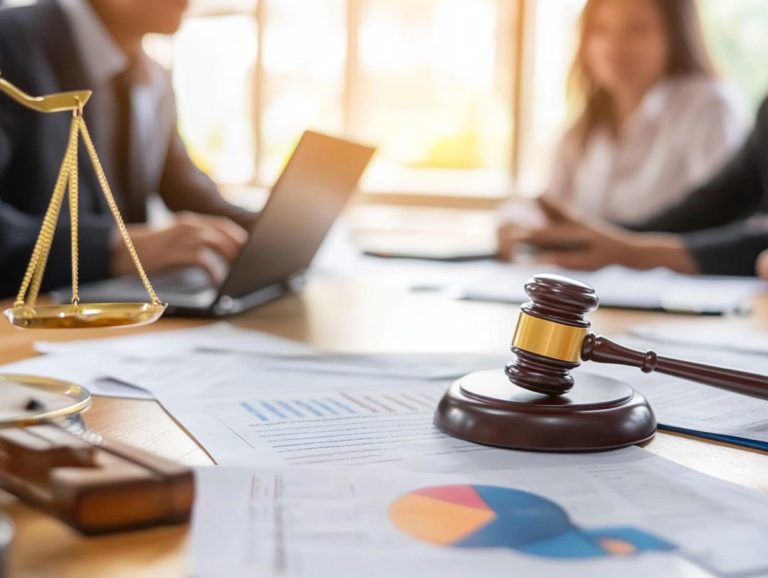Rights of the Accused: What You Need to Know
In today’s legal landscape, knowing your rights as an accused person is key to facing legal challenges confidently. These rights uphold the principle of justice, ensuring that individuals receive fair treatment throughout the judicial process.
This article delves into the fundamental rights of the accused, from the presumption of innocence to the right to remain silent. It highlights the significance of a fair trial, discusses applicable limitations, and outlines practical steps to safeguard your rights.
Whether you re seeking knowledge for yourself or someone you care about, this guide offers essential insights that empower you in the face of legal complexities.
Contents
- Key Takeaways:
- Understanding the Rights of the Accused
- The Importance of the Rights of the Accused
- Common Rights of the Accused
- Limitations of the Rights of the Accused
- Exceptions and Restrictions
- How to Protect Your Rights as an Accused Individual
- Steps to Take and Resources Available
- Frequently Asked Questions
Key Takeaways:
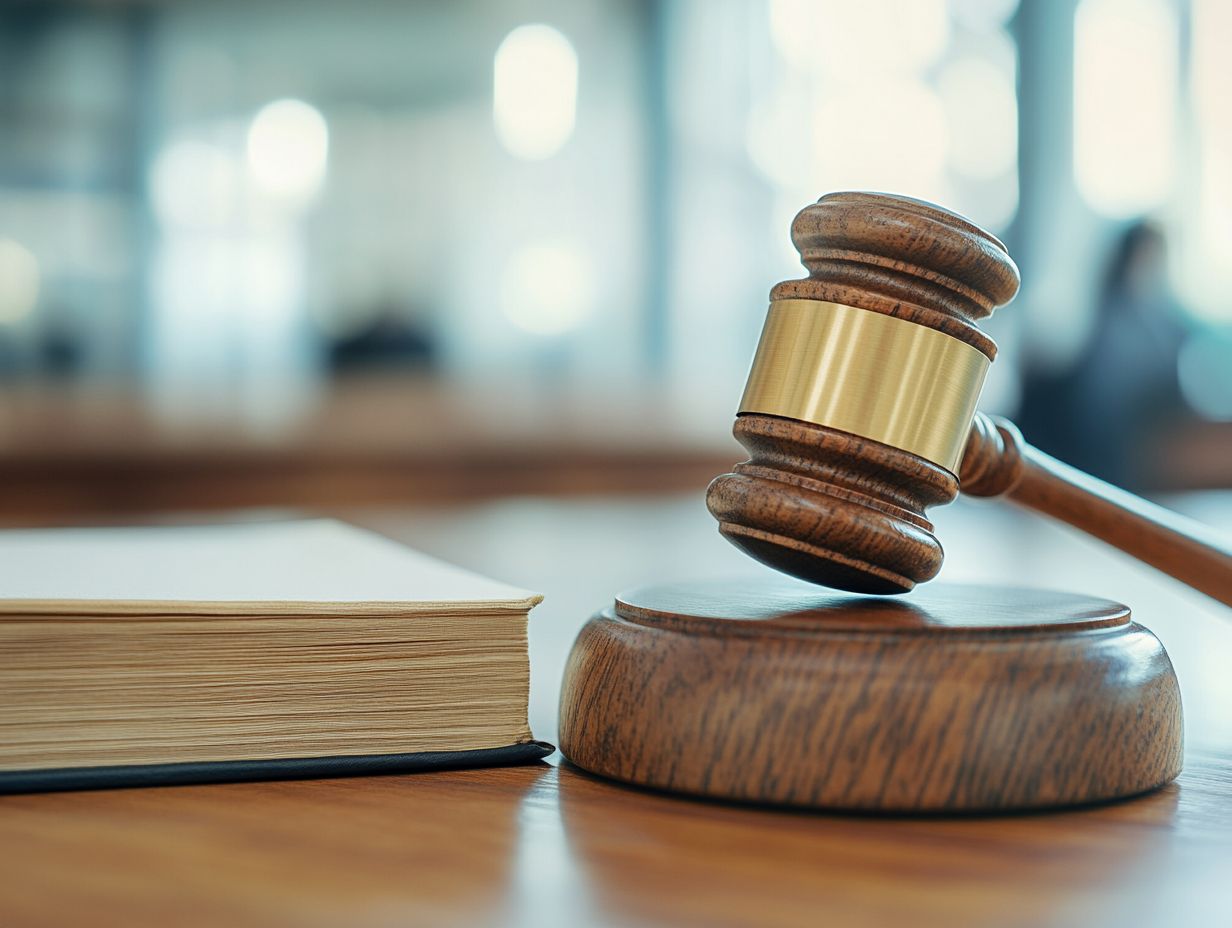
- Know your rights as an accused individual, including the right to a fair trial and due process.
- Some common rights of the accused include the right to an attorney, the right to remain silent, and the right to a speedy trial.
- Be aware of limitations and exceptions to the rights of the accused and take steps to protect your rights with the help of available resources.
Understanding the Rights of the Accused
Understanding the rights of the accused is crucial for navigating the complexities of criminal prosecution with confidence.
The Sixth Amendment offers several vital protections, including your right to counsel, fair treatment under the law, and a fair trial. These rights are carefully designed to uphold justice and equality before the law, ensuring you have a genuine opportunity to defend yourself against any accusations.
Access to a lawyer and legal assistance are essential elements that preserve the integrity of the legal process. Grasping this understanding is not only crucial for you as the accused but also for the overall vitality of a democratic society.
What are the Rights of the Accused?
The rights of the accused are designed to provide you with a robust framework of legal protections, ensuring that you receive a fair trial and due process under the law. These protections include your right to legal assistance, giving you the power to seek guidance from qualified attorneys who can expertly navigate the complexities of the criminal justice system on your behalf.
You also have the right to access vital information necessary for constructing a strong defense. This can significantly affect the outcome of your case. Take, for instance, the landmark case of Brady v. Maryland, where the U.S. Supreme Court determined that withholding exculpatory evidence from the defense is a violation of the right to a fair trial.
Your right to compulsory process lets you summon witnesses who can support your case. This was notably highlighted in Washington v. Texas, where the court acknowledged that eyewitness testimony could profoundly influence the jury’s perception.
These rights are essential for justice, underscoring the importance of safeguarding those who find themselves accused of crimes.
The Importance of the Rights of the Accused
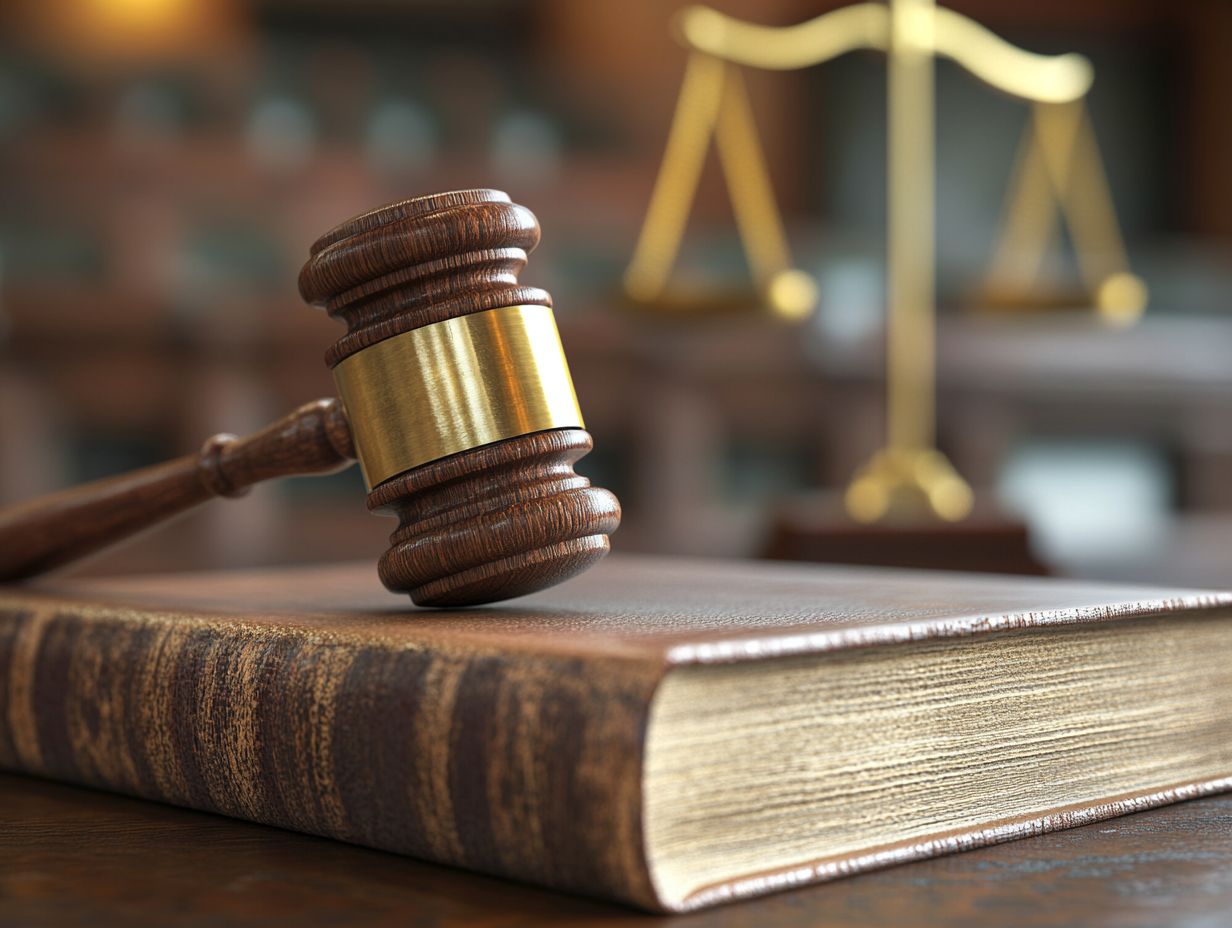
The significance of the rights of the accused rests in the protection of the fundamental principle of presumption of innocence, a cornerstone of justice that asserts individuals are considered innocent until proven guilty.
This principle serves as a vital safeguard, ensuring that fairness prevails in the legal system.
Presumption of Innocence
The presumption of innocence is a cornerstone legal principle that safeguards your rights as an accused individual, ensuring you are treated as innocent until proven guilty. This principle, steeped in centuries of legal tradition, traces its roots back to Roman law and has been incorporated into various legal systems worldwide, including fundamental charters of human rights.
Its importance transcends mere legal jargon; it shapes court operations and significantly influences how justice is perceived by the public. By placing the burden of proof squarely on the prosecution, it protects you from arbitrary punishment and guarantees a fair trial.
In this way, the presumption of innocence is crucial for maintaining the integrity of the judicial system, reinforcing the belief that every individual deserves the opportunity to defend themselves against accusations without bias.
Fair Trial and Due Process
Fair trials and due process are fundamental to your rights as an accused individual. They ensure you receive equal treatment under the law and keep your confidence that your case will be heard fairly.
Legal representation is crucial in this process. It helps you navigate the complicated legal system with a knowledgeable advocate by your side.
An impartial jury guarantees decisions are based on evidence, not personal biases. These elements protect your rights and contribute to a more just society.
Common Rights of the Accused
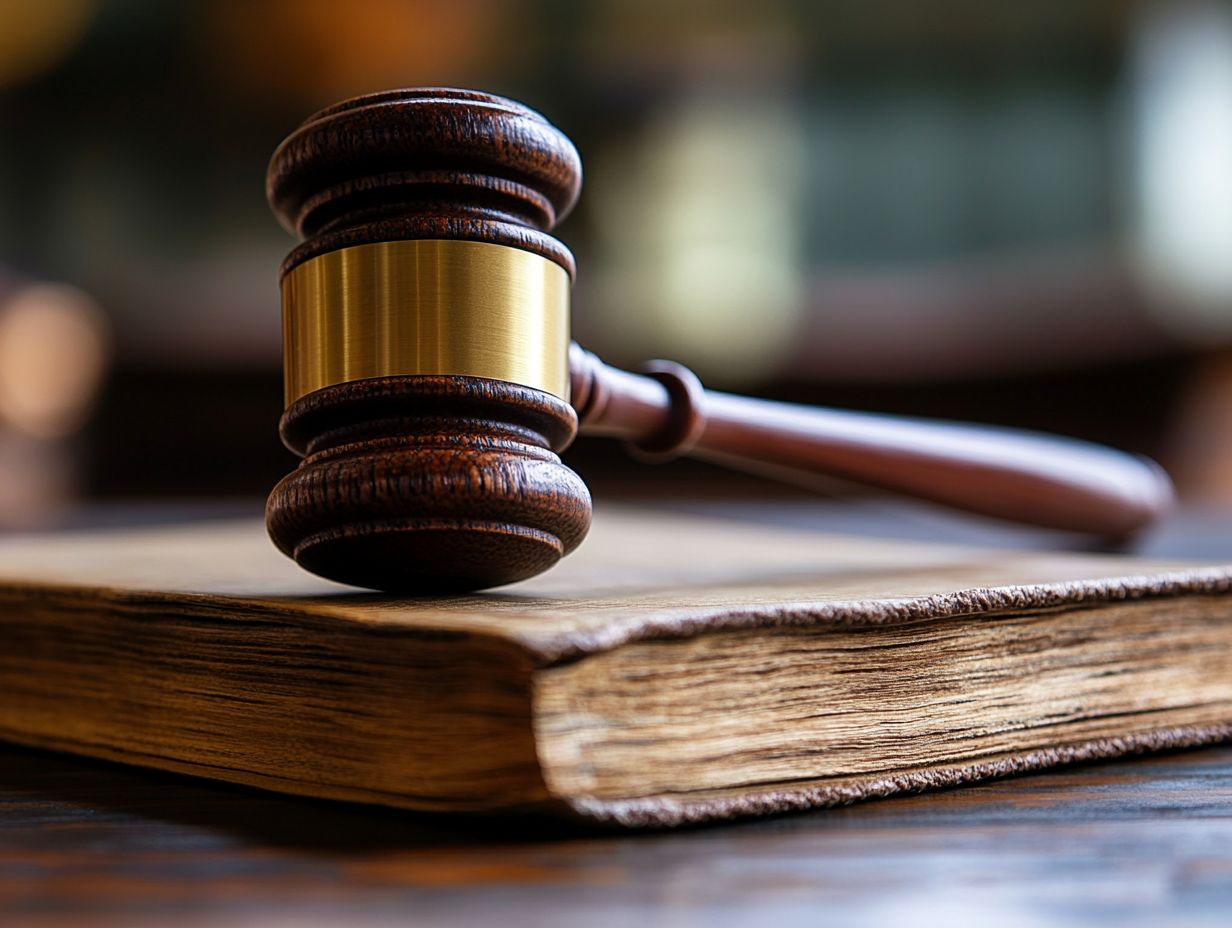
Common rights of the accused include important legal protections for your defense. You have the right to an attorney to ensure you receive proper guidance and representation.
The right to remain silent protects you from self-incrimination. It allows you to navigate the legal landscape without compromising your case.
The right to a speedy trial is also crucial. It helps prevent delays in your case, ensuring justice is served promptly.
These rights safeguard your interests and promote a fair legal process.
Right to an Attorney
The right to an attorney is a cornerstone of your rights as an accused. It ensures you have legal assistance throughout the criminal justice process.
This vital safeguard gives you the power to navigate the complicated legal system with professional guidance. Landmark cases like Gideon v. Wainwright show that states must provide counsel to those who can’t afford it.
This ruling emphasizes the judicial system’s duty to uphold fairness. It helps fortify your rights and enhances the overall integrity of legal proceedings.
Right to Remain Silent
The right to remain silent, as stated in the Miranda warning, protects you from self-incrimination during interrogations. This principle, based on the Fifth Amendment, gives you the power to avoid statements that could be used against you in court.
Understanding its history reveals significant changes in legal practices designed to prevent coercion. When officers deliver the Miranda warning, they play a crucial role in protecting your rights.
This warning informs you of your rights and lays the groundwork for a fair judicial process.
Right to a Speedy Trial
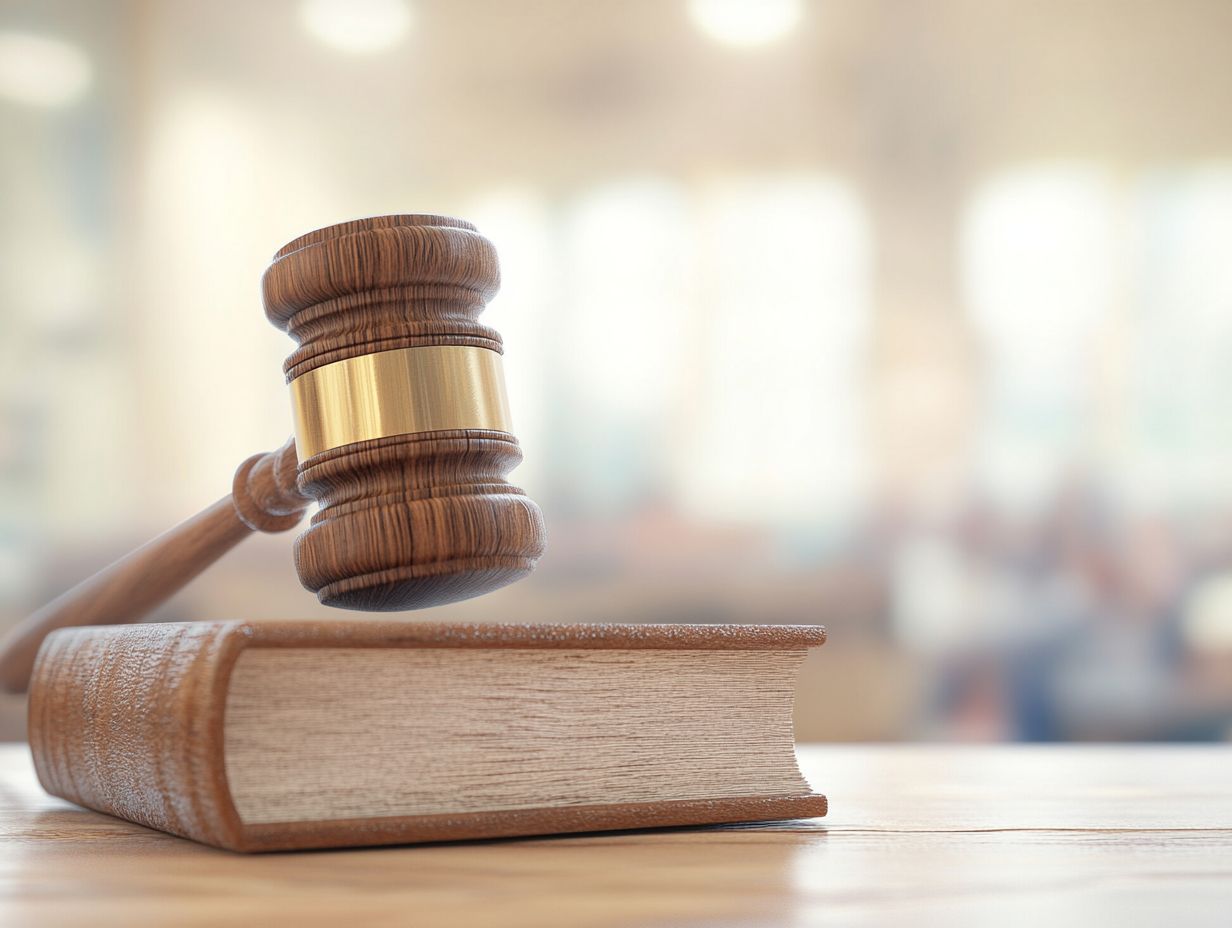
The right to a speedy trial ensures you are not left waiting in detention without resolution. This right is based on due process, balancing justice with protections for those facing charges.
Courts have explored this right in landmark cases like Strunk v. United States. These cases highlight the importance of quick legal proceedings to maintain the integrity of the judicial system.
This right protects you from arbitrary imprisonment and ensures your case is heard fairly and efficiently. It also allows you to prepare your defense without unnecessary delays.
Limitations of the Rights of the Accused
While the rights of the accused are well-established, limitations can arise. These may influence how your rights are applied in specific legal contexts.
Exceptions and Restrictions
Exceptions and restrictions to the rights of the accused can emerge in specific legal contexts, shaping the legal protections available to you. For example, in scenarios involving national security, certain rights may be limited to prevent the leakage of sensitive information that could endanger public safety.
The reasoning behind these limitations often hinges on the necessity of balancing individual rights with the collective security of society. During emergencies, courts might implement stricter protocols that can overshadow standard legal procedures that protect individuals’ rights in court.
In these circumstances, the judicial system must carefully assess the need for such restrictions, weighing the urgent demands of the state against the fundamental principles of justice and fairness that are the bedrock of the legal system.
How to Protect Your Rights as an Accused Individual
Protecting your rights as an accused individual is essential when navigating the intricate landscape of the criminal justice system. You must secure a skilled lawyer to build a strong defense your future depends on it!
Additionally, you need the necessary resources to help you build a formidable defense.
Steps to Take and Resources Available
There are several steps you can take to safeguard your rights and ensure you receive adequate legal assistance throughout the process.
For instance, reaching out to local legal aid organizations can provide you with crucial support, as these resources often offer free or low-cost legal advice tailored to your specific situation.
It s essential for you to familiarize yourself with your rights, including the right to remain silent and the right to a fair trial. Gathering information and understanding the legal system can empower you, enabling you to navigate your case more effectively.
Educating yourself about potential legal outcomes and preparing the necessary documentation can also be instrumental in building a robust defense.
Frequently Asked Questions
- What are the rights of the accused?
The rights of the accused refer to the legal protections that individuals have when they are suspected or accused of committing a crime. - What is the purpose of these rights?
The purpose of these rights is to ensure fair treatment and due process for the accused, as well as to protect them from potential abuses by the government or law enforcement. - What are some examples of rights of the accused?
Examples of these rights include the right to remain silent, the right to an attorney, the right to a fair and speedy trial, and the right to confront witnesses. - Are these rights guaranteed to everyone?
These rights are guaranteed to all individuals in the United States, regardless of their citizenship status. The Constitution’s Bill of Rights applies to all persons within the country’s borders. - What happens if these rights are violated?
If these rights are violated, the accused may be able to challenge the criminal charges against them and have the evidence obtained through the violation excluded from their trial. In some cases, the charges may be dismissed altogether. - Do these rights apply to all stages of the criminal justice process?
Yes, the rights of the accused apply to all stages of the criminal justice process, from the initial arrest to the trial and any potential appeals. They are meant to protect the accused at every step of the way.
For more information and support, don’t hesitate to reach out to local organizations that can help you navigate your rights and options.

